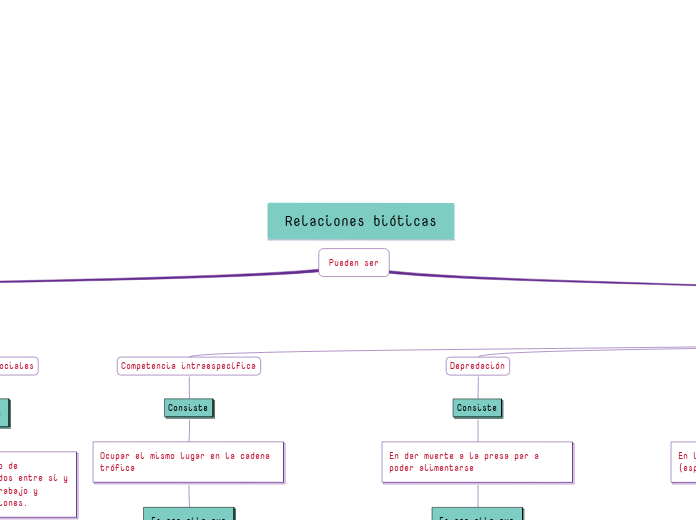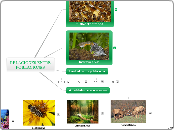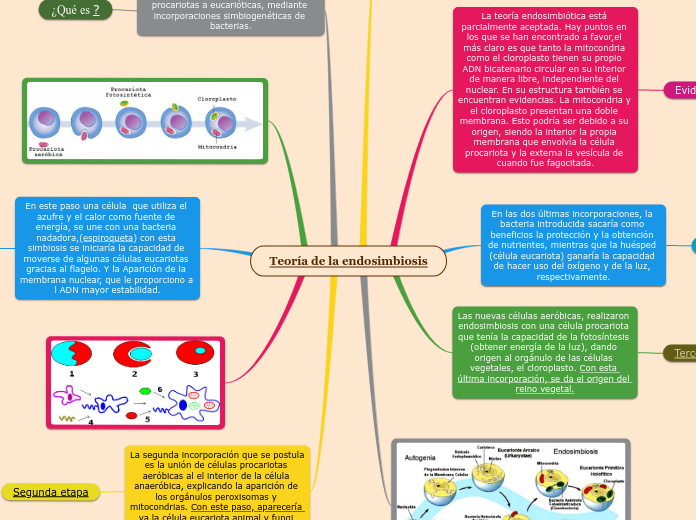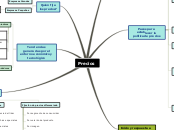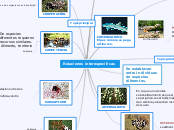Relaciones bióticas
Pueden ser
Type in the name of the multiple-perspectives text.
Example: Bridge to Terabithia by Katherine Paterson
Relaciones interespecíficas
Parasitismo
En que el parásito se alimenta a expensas de otro
Incluso llega a perjudicarlo y muy raramente mata
-Pulgas
-Piojos
Comensalismo
En el beneficio de un individuo mientras que el otro no es beneficiado ni perjudicado
No perjudica a ningún individuo
-Los cangrejos
-Pez rémora
Mutualismo
En que dos individuos se benefician mutuamente
Que el pez payaso vive en la actinia buscando protección ya que esta captura a los peces que intentan depredar a este
-Abejas y flores
-Pez payaso y actinia
Se establecen entre organismos de distinta especie, pueden ser relaciones negativas, neutras o positivas.
Simbiosis
En la cooperación de dos especies (especies simbiontes)
Es tan intensa que ninguna puede vivir por separado
-Algas
-Hongos
Depredación
En dar muerte a la presa par a poder alimentarse
El depredador caza
-Las caballas son depredadoras de las medusas
-Los guepardos de los ciervos
Competencia intraespecífica
Type in a relevant quote that highlights the character's point of view towards
Relaciones interespecíficas.
Try following a citation format: author's name, chapter, and page.
Example: 'Jesse drew the way some people drank whiskey. (...) Lord, he loved to draw. (...) When he was in first grade, he told his father that he wanted to be an artist when he grew up.' (Paterson, 2. 7)
Ocupar el mismo lugar en la cadena trófica
Compiten por el mismo alimento
-Ñues
-Cebras
Relaciones intraespecíficas
Identify an important issue from the text that is being presented from different angles. Type it in.
Example: Jesse's drawing talent.
Asociaciones sociales
Decide on the fourth point of view
Type in the name of the last character whose perspective on the issue you are going to present.
Example: Leslie Burke, Jesse's new next-door neighbor, and best friend.
Point of view
Type in a relevant quote that highlights the character's point of view. Try to follow a citation format: author's name, chapter, and page.
Example: I can't get the poetry of the trees,' he said. She nodded. Don't worry,' she said. You will someday. He believed her.' (Paterson, 4. 24)
En que son un conjunto de individuos jerarquizados entre sí y con distribución de trabajo y tienen distintas funciones.
How is the viewpoint introduced in the story?
Choose an answer:
First person point of view - using the personal pronouns 'I' or 'we'Second person point of view - using the personal pronoun 'you'Third person point of view - using the third-person pronouns 'he', 'she' and 'they'Omniscient point of view - an all-seeing observer tells the story
Los individuos suelen presentar diferencias anatómicas y fisiológicas.
-Las abejas
-Las hormigas
Asociaciones coloniales
Whose character does the third point of view belong to?
Type in his/her name.
Example: Mr. Aarons, Jesse's father.
What does the character think, say or do that suggests their perspective on the issue?
Type in a quote and try to maintain the citation format.
Example: 'He would like to show his drawings to his dad, but he didn't dare. (...) He'd thought his dad would be pleased. He wasn't. What are they teaching in that damn school? he had asked.' (Paterson, 2.8)
En que los descendientes se unen a sus progenitores para sobrevivir, ya que se especializan en distintas funciones.
What kind of narration introduces the viewpoint?
Choose an answer:
First person point of view - using the personal pronouns 'I' or 'we'Second person point of view - using the personal pronoun 'you'Third person point of view - using the third-person pronouns 'he', 'she' and 'they'Omniscient point of view - an all-seeing observer tells the story
Permanecen unidos físicamente, de forma inseparable formando colonias o un organismo común
-Bacterias
-Los corales
Son las interacciones que se establecen entre los individuos de la misma especies.
Estas relaciones pueden ser perjudiciales, si provocan la competencia entre los individuos, o beneficiosas, si favorecen su cooperación.
Asociaciones gregarias
Decide on the second point of view
Name the character (it can either be the main character or one of the supporting characters) whose point of view you are presenting.
Example: Miss Edmunds, Jesse's music teacher.
Type in a quote that points out the character's position about the issue.
Try to follow a citation format: author's name, chapter, and page.
Example: 'She said he was unusually talented, and she hoped he wouldn't let anything discourage him.' (Paterson, 2. 8)
En obtener beneficios o algunas ventajas, por ejemplo: buscar alimento, defenderse o migrar.
How is the viewpoint introduced in the story?
Choose an answer:
First person point of viewSecond person point of viewThird person point of viewOmniscient point of view
Los individuos se unen
-Bancos de peces
-Bandadas de aves
Asociaciones familiares
Decide on the first point of view you are going to present.
Type in the name of the character (it can either be the main character or one of the supporting characters) whose point of view belongs to.
Example: Jesse Oliver Aarons, Jr., the main character of the novel, a fifth-grader living in a rural Southern area.
Consiste
Type in a relevant quote that highlights the character's point of view towards
Relaciones intraespecíficas.
Try following a citation format: author's name, chapter, and page.
Example: 'Jesse drew the way some people drank whiskey. (...) Lord, he loved to draw. (...) When he was in first grade, he told his father that he wanted to be an artist when he grew up.' (Paterson, 2. 7)
En facilitar el cuidado de las crías y facilitar la reproducción y protección.
What type of narration introduces the viewpoint?
Choose an answer:
First person point of view - using the personal pronouns 'I' or 'we'Second person point of view - using the personal pronoun 'you'Third person point of view - using the third-person pronouns 'he', 'she' and 'they'Omniscient point of view - an all-seeing observer tells the story
Es por ello que
Los grupos están formados por sus progenitores y descendientes.
Por ejemplo:
-Manadas de elefantes
-Manadas de leones
